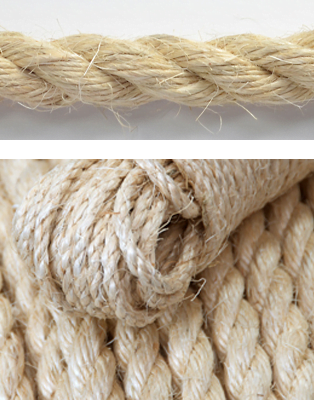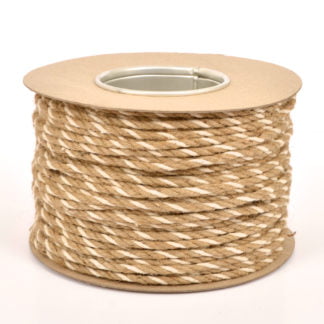Natural Ropes
Made from natural plant fibres, our natural ropes come in a range of special organic materials, including cotton, jute, mixed fibre, hemp, sisal and manila ropes. Having been sourced from plants, these ropes have a more traditional, rustic feel and finish, making them perfectly suited for organic projects, gardening, crafts and pet items.
Versatile, sturdy and rustic, our organic ropes can also be sourced in thicker sizes upon request, but our natural hemp, cotton and manila rope materials are already amply matched for work or projects that need thicker roping solutions. Our natural ropes are available to purchase in diameters of 6mm to 32mm, so order today to get the exact ropes you need in just two to three working days.
For more tips on how to treat natural ropes or for any more info, call us on 01204 897642 or contact us today.
-

Manila Rope (56)
-

Natural Hemp Rope (1)
-

Sisal Rope (38)
-

Cotton Rope (13)
-

Mixed Fibre Natural Rope (4)
-

Soft Cotton Braided Rope (8)
-

Twisted Jute (7)
What are the benefits and uses of natural rope?
Before the introduction of synthetic ropes (like our polypropylene ropes), natural ropes such as cotton, hemp and manila were the standard materials used for many industries – and they’re still widely used today. Natural ropes are used for decking, decorative work, cat-scratching posts, gardening, farming, clothing, manufacturing and much more.
These natural fibre ropes are eco-friendly and biodegradable, meaning they will eventually naturally decompose. Our plant-sourced ropes can be used both inside and outside, but we recommend they are treated for outdoor use to get the most durability out of them. This is because ropes made from natural fibres can shrink in length and expand in girth when wet, so it’s best to order more than required and leave a little slack in the rope.
Exposure to the elements will also eventually lead them to deteriorate if left untreated. We therefore advise treating them with a water repellent spray or decking oil before use as a decking rope and not to drill the posts until your rope has been received, as they can often measure thicker than stated. Once treated, a natural rope can last for years before needing to be replaced, even with regular outdoor use.
Frequently asked questions about natural rope
What’s the longest lasting natural rope?
Manila rope and natural sisal rope are both very strong natural materials, but manila in particular can be very long-lasting without treatment because of the natural oils used in its production. Manila is also very resistant to rot compared to other natural ropes, so it’s a great choice for outdoor use (e.g. for gardening). However, manila rope is also quite rough in the hands and has quite a strong odour. Sisal rope is odourless but it has to be treated if being used outdoors.
What is the strongest natural rope?
Manila and sisal are the strongest natural fibre ropes on the market. Our manila ropes and sisal ropes are extremely strong, durable, thick and sturdy, making them historically the type of rope that would be used on ships and for lifting applications. However, these days manila and sisal are used more for decorative applications such as garden decking and barrier rope, and untreated sisal rope is often used for cat scratchers, pet toys and general DIY applications.
How long does natural rope last?
Although natural ropes generally don’t last as long as synthetic ropes, you can still get plenty of use out of them. If you look after them well and treat them before using them outside, your natural ropes should last for a few years, even with regular use. Once you notice excessive fraying and stretching, you’ll know it’s time to replace your rope before it breaks.







